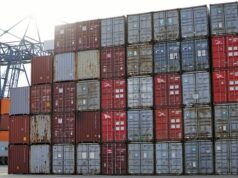The Philippine Bureau of Customs (BOC) has released guidelines on the registration of customs brokers and their representatives transacting with the customs agency.
Customs Administrative Order (CAO) 05-2019, signed by Customs commissioner Rey Leonardo Guerrero on April 26 and Finance Secretary Carlos Dominguez III on May 6, contains many similar rules from previous regulations, including the need for customs brokers who lodge and process goods declaration at the BOC to register and obtain a Certificate of Registration (COR) from the customs bureau.
Under the old regulations, brokers at the end of the application process were given a certificate of accreditation.
A new provision under CAO 05-2019 allows customs brokers who have formed a general professional partnership to apply for registration with BOC; this registration will be separate and distinct from the personality of each of the partners, who must be customs brokers.
CAO 05-2019 was issued to prevent smuggling and fraud, regulate the conduct of brokers transacting with the BOC, streamline requirements for registration of brokers and their representatives, and establish a registration information management system.
It implements Sections 1200 (Customs Brokers and Other Service Providers), 1226 (Supervision and Regulation of Third Parties), and other relevant provisions of Republic Act (RA) No. 10863 or the Customs Modernization and Tariff Act (CMTA), and RA 9280 or the Customs Brokers Act of 2004, and other related laws.
The order amends all previous issuances of BOC relating to the registration of customs brokers, and takes effect 30 days after publication in the Official Gazette or a newspaper of general circulation.
Under CAO 05-2019, “A customs broker acting as a declarant shall be presumed to be the agent of the consignee or importer and as such may be made accountable and liable for any violation of the CMTA and other related laws.”
A customs broker employed by another customs broker and acting for his/her employer does not need to apply for a separate registration as long as his name appears on the notarized list of customs broker’s representatives that will be submitted to the BOC by the registered customs broker.
The customs broker’s representative authorized to act for the customs broker in the processing of entries, permits, and other customs documents related to the customs broker’s practice of his/her profession must possess minimum qualifications set under CAO 05-2019.
The Customs commissioner may limit the number of customs broker’s representatives to the number of transactions of every customs broker in each port. The access pass issued to the customs broker’s representative to get inside BOC premises must be surrendered by the employer customs broker to BOC in the event the registration of the latter in the bureau is revoked, cancelled, or expired.
“The customs broker shall exercise strict supervision and control over their representatives when following up transactions related to their customs practice,” CAO 05-2019 stated. It added that customs brokers shall be held “jointly and solidarily liable for any and all acts or omissions of their representatives which, in the exercise of their due and reasonable care and diligence, they could have foreseen or prevented.”
The Customs commissioner shall issue a customs memorandum order prescribing the procedure for the disciplinary action against customs broker’s representatives.
BOC’s Account Management Office (AMO) or its equivalent office will process applications for the registration and the issuance of COR of customs brokers.
The Customs commissioner may also create a satellite office of AMO at any strategic areas or ports outside Metro Manila. Prior to the creation of satellite offices, applications for customs brokers outside Metro Manila may be filed with the district collector through the Customs Intelligence and Investigation Service (CIIS) of the customs district where the customs broker regularly transacts with. The district collector shall have the ministerial duty to transmit the application within one working day from receipt of complete documentary requirements and failure to do so may be a ground for disciplinary action.
Grounds for the denial of a new application include absence or misrepresentation of material information; submission of falsified or spurious documents; and conviction of an offense pursuant to Section 1401 (Unlawful Importation or Exportation) of the CMTA.
The Customs commissioner shall approve or disapprove the application upon recommendation of AMO or its equivalent office, or CIIS. The Customs commissioner may also delegate the authority to approve and disapprove to any senior official of BOC.
The application for registration shall be approved or disapproved within five working days from the date of receipt of complete documents.
In case of disapproval of application, a notice of disapproval clearly stating the grounds therefor, shall be signed and served to the applicant, copy furnished the accredited integrated professional organization of customs brokers. CAO 05-2019 noted that the applicant at any time may re-file his/her application.
In cases where the application is disapproved on the ground other than lack of documentary requirements, the applicant customs broker may file a Motion for Reconsideration (MR) or Appeal on the denial of application.
The COR shall be valid for three years from the year of issuance unless suspended or revoked for cause. Provided that every year in between the three-year period, the customs broker must submit the annual reportorial requirements to update his/her profile and submit an Affidavit of Change of Circumstances if there are any material change/s on his original application form, or Affidavit of No Change if there are no changes, as may be provided under the corresponding CMO.
Renewal of application must be filed within one month prior to the expiration of the COR. However, no application for renewal shall be accepted or entertained if filed within five working days prior to the fate of COR expiration. Any application filed after the registration has expired shall be considered as a new application.
No application for renewal of registration shall be accepted if the COR has been revoked for cause during the time it was subsisting, unless subsequently lifted by the Customs commissioner.
The absence or misinterpretation of material information and misuse of registration privilege shall be ground for the disapproval of the application for renewal and/or blacklisting of the customs broker.
The registration as customs broker shall continue to be valid within the period of renewal. Failure on the part of the customs broker to renew his/her registration shall consider the registration as expired or delisted, and therefore he/she shall not be allowed to lodge or file any goods declaration with BOC.
Application for renewal which is timely filed but not acted upon by AMO within five working days shall be deemed approved and their registration shall be considered valid and active as if renewed, provided that all required documents have been submitted and all fees paid.
Violations by registered customs brokers under CAO 05-2019 are classified as light offense and grave offense. Light offense is for violation of Sections 5.7.1 (mandatory maintenance and updating of electronic email addresses and contact numbers) and 5.7.2 (display of certificate), while grave offense is for violation of Sections 5.7.3 to 5.7.7 (lodgement of goods declaration, record keeping, misinterpretation by omission or commission, error or omission by clients, and illegal schemes) and 5.8 to 5.14 (retention of records, interference of examination of records, diligence in correspondence and paying monies, false information, undue influence of government officials and employees, misuse of registration privilege, and relations to a customs broker whose registration has been cancelled or suspended) of CAO 05-2019.
“The practice of customs broker profession is imbued with the public service, as it involves collection of taxes which is the lifeblood of the government; and facilitation of international trade, which affects the economic development of the country. It is therefore imperative that a customs broker be guided by the set of standards for the effective, efficient, and consistent discharge of his duties and responsibilities,” CAO 05-2019 noted.
Grounds for the revocation of registration include deliberate failure or refusal without justifiable reasons to comply with the duties and responsibilities prescribed in CAO 05-2019; and violation of existing customs laws, rules, and regulations.
Violations of CAO 05-2019 are categorized into first, second, and third offenses. For the first offense with a light offense, there is only severe warning. But if the first offense is a grave offense, there will be a suspension of six months or fine of P100,000. Second offense is suspension of one year for light offense; and fine of P200,000 for grave offense. Third offense is a penalty of P300,000 for a light offense, or a revocation of registration for a grave offense. – Roumina Pablo









